In an era where financial savvy is not just a luxury but a necessity, homeowners are often on the lookout for ways to make their investments work smarter. ‘Cash-Out Refinance’ is a phrase that’s been making the rounds in the mortgage world, gaining traction as a strategy many are using to tap into the equity of their homes for various financial needs.
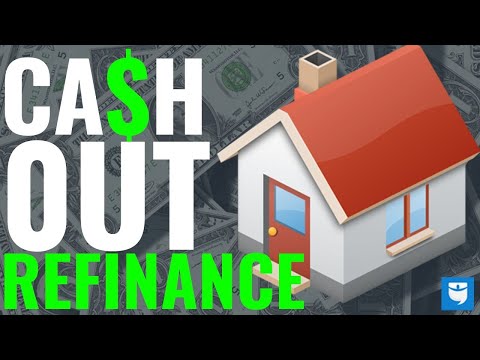
Understanding the Basics of Cash-Out Refinance
A cash-out refinance is a type of mortgage refinance that takes advantage of the equity you’ve built over time and gives you cash in exchange for taking on a larger mortgage. In essence, you borrow more than you owe on your mortgage and pocket the difference.
Current trends and rates in 2024: The landscape for cash-out refinance options is continually evolving. As we stand in 2024, interest rates have experienced fluctuations influenced by economic conditions. Homeowners looking to refinance are keenly observing these trends to securely leverage their assets.
How to get out of debt the quick, simple, easy to understand guide to your financial freedom credit card debt, debt free, debt consolidation, debt help, debt review, increase income, lower expenses
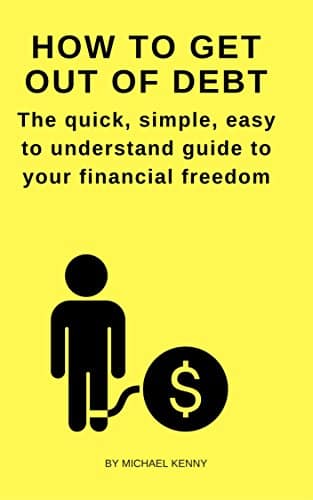
$2.99
“Escape the shackles of debt with our transformative guide, ‘How to Get Out of Debt: The Quick, Easy-to-Understand Guide to Your Financial Freedom.’ This invaluable resource simplifies the journey towards a debt-free life by distilling complex financial advice into accessible, actionable steps. It tackles various forms of debt head-on, providing tailored strategies for overcoming credit card debt, navigating debt consolidation, and understanding the nuanced processes of a debt review. Our guide empowers you to make informed decisions that will pave your way to financial liberation, offering practical tips on increasing income and lowering expenses without sacrificing your quality of life.
Take control of your finances with the proven techniques outlined in our comprehensive manual, designed for those seeking immediate relief and long-term stability. Our guide demystifies the debt repayment process, offering a clear roadmap peppered with insider tips to expedite your journey out of debt. With chapters dedicated to budgeting, negotiating with creditors, and finding hidden opportunities to save money, this book is the essential tool for anyone committed to becoming debt-free. Experience the peace of mind that comes with a sound fiscal plan, made easier by our expert insights and empathetic approach.
‘How to Get Out of Debt’ is more than just a book; it’s a lifeline for anyone drowning in financial obligations. Its straightforward language ensures that no reader is left behind, regardless of their financial literacy level. Witness your debts diminish and your savings grow as you apply the practical advice on frugality, smart investing, and conscious consumption. Start turning the page on your debt today and step into a more secure, prosperous financial future with this indispensable guide by your side.”
Evaluating Your Financial Health for a Cash-Out Refinance
Before you decide on a cash-out refinance, it’s crucial to take a pulse on your financial health.

| Criteria | Details |
|---|---|
| Definition | A mortgage refinance where the new loan amount is greater than the owed amount on the original mortgage, with the borrower receiving the difference in cash. |
| Ideal for | Borrowers wanting to tap into home equity without altering a low mortgage rate; those seeking lower monthly payments; individuals with lower credit scores; those preferring stable payments. |
| Current CLTV (Combined Loan-to-Value) | With common lenders: Max 80% CLTV; Discover Home Loans: Up to 90% CLTV. |
| CLTV Calculation | Current mortgage balance ÷ home’s appraised value = Current CLTV. |
| Impact on Credit Score | New loan can affect credit age; larger loan balance could increase credit utilization ratio. |
| Interest Rates Comparison | Beneficial if current mortgage rates are lower than the original; not advisable if rates have increased significantly. |
| Process | Similar to a home buying process: application, underwriting, approval, closing; can take several weeks. |
| Cash Accessibility | Lump-sum payment; closing costs and original mortgage paid first; remaining funds to borrower. |
| Potential Downsides | Extended approval process; loan terms may change; immediate cash availability may be delayed; can increase monthly payments and stretch budget. |
| Qualification Criteria | Credit score: Generally at least 620; Debt-to-income ratio: 43% or lower; Sufficient home equity (at least 20% for conventional, more for VA loans). |
| How Much Can You Borrow? | Typically up to 80% of home’s value with conventional loans; VA loans may allow up to 100%. |
| Impact on Monthly Payments | May lower monthly payments if current rates are lower; higher loan amount could result in larger payments. |
Strategy 1: Debt Consolidation Through Cash-Out Refinance
Combining multiple high-interest debts into your mortgage can be a shrewd tactic. Here’s why:
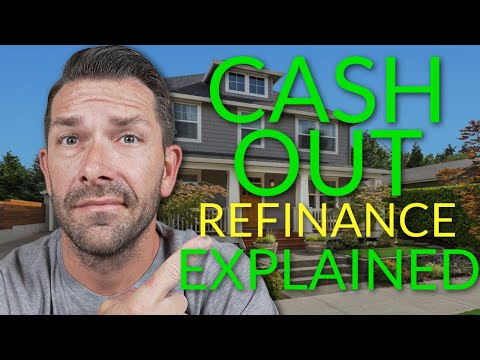
Strategy 2: Home Improvement Investments with Cash-Out Refinance
Upgrading your living space could increase your home’s market value—think of it as investing in your investment.
BRRRR Buy Rehab Rent Refinance Repeat T Shirt
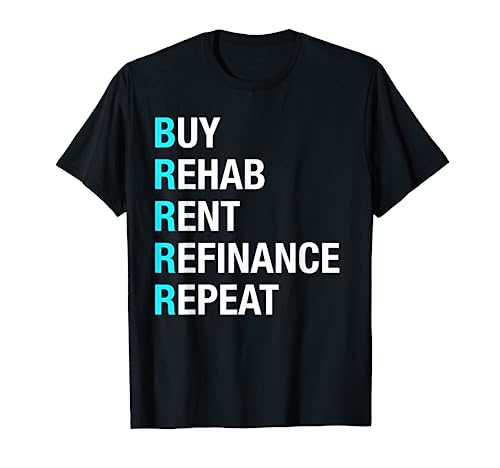
$21.99
Unlock the secret to successful real estate investment with this eye-catching ‘BRRRR Buy Rehab Rent Refinance Repeat T-Shirt’. This sleek and stylish tee is not just a piece of clothing; it’s a badge of honor for savvy investors who practice the BRRRR methoda proven strategy for building wealth through real estate. With its bold lettering and crisp design, it clearly lays out the steps: Buy, Rehab, Rent, Refinance, Repeat, serving as a conversation starter and a reminder of the path to financial freedom.
Constructed from high-quality materials, this t-shirt is designed for comfort and durability, ideal for the busy property investor on the go. Whether you’re overseeing a rehab project, meeting with potential tenants, or just relaxing with other real estate enthusiasts, this shirt will keep you comfortable all day long. Its versatile design means it pairs effortlessly with jeans for a casual look or can be dressed up with a blazer for those more professional encounters.
What sets this t-shirt apart is not just its practical quality, but the way it encapsulates the essence of the BRRRR strategy’s cyclical nature. From casual Fridays at the office to real estate seminars, wearing this t-shirt will show the world that you’re in the know when it comes to intelligent investing. As an excellent gift for the real estate mogul in your circle or a treat for yourself, this ‘BRRRR Buy Rehab Rent Refinance Repeat T-Shirt’ is the perfect wardrobe staple for those who mean business in the property game.
Strategy 3: Funding Education or Business Ventures
Cash-out refinancing can also act as a catapult for educational pursuits or launching that dream business venture.

Strategy 4: Cash-Out Refinance for Diversification of Investments
As Robert Kiyosaki would advise, don’t put all your eggs in one basket.
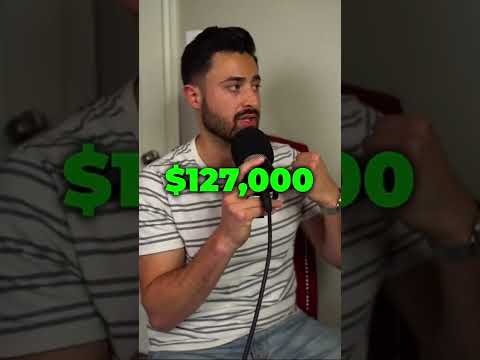
Strategy 5: Planning for the Unexpected: Emergency Funds
Life throws curveballs, and an emergency fund is your financial safety net.
How To Save Up Front With A No Out of Pocket Home Refinance

$2.99
Securing a home refinance can often seem like an unattainable goal due to the steep initial costs involved, but the innovative ‘How To Save Up Front With A No Out of Pocket Home Refinance’ guide opens the door to affordability. This comprehensive product empowers homeowners with actionable strategies to refinance their mortgage without the burden of upfront payments. By navigating through the maze of lender fees, closing costs, and financial prerequisites, this guide lays out a clear path to restructuring your home loan under more favorable terms. It is a critical tool for those looking to reduce their monthly payments or free up cash without the immediate financial strain.
The guide is expertly structured to cater to a wide range of financial circumstances, ensuring that whether you have ample equity in your home or you’re just starting to build it, you are presented with options tailored to your situation. With a focus on lesser-known lender programs and government incentives, users will be exposed to a variety of refinancing opportunities that could bypass large out-of-pocket expenses. Clear, step-by-step instructions demystify the often complex process of securing a refinance, making it accessible to both seasoned homeowners and first-time applicants alike. The guide doesn’t just offer a one-size-fits-all solution; it also includes personalized tips and tricks to maximize individual saving potential.
‘How To Save Up Front With A No Out of Pocket Home Refinance’ also acknowledges the dynamic nature of the housing market and adapts to the latest industry standards and regulatory changes. Readers will not only learn about current options but will gain insights into how to monitor and anticipate market shifts which could further benefit their financial goals. Along with exclusive online resources, tools, and calculators, this guide serves as an ongoing reference to ensure homeowners are always equipped with the knowledge to make the best refinancing choices. As a result, it’s more than a one-time readit’s a lifelong companion in the journey to financial freedom and smart homeownership.
Innovative Uses of Cash-Out Refinance in 2024
With a new year comes new ways of thinking about finance.

Navigating the Refinancing Process
It’s not just about signing papers; it’s a journey that demands due diligence.
Conclusion: The Roadmap to a Smart Cash-Out Refinance
In tying the knot on our discussion, remember that a one-size-fits-all approach doesn’t work with cash-out refinances. Your financial health, long-term goals, and the risks involved are the compass that should guide your decision-making.
The prospects are ever-changing. Just like the financial market, the strategies and opportunities for cash-out refinancing will continue to evolve. As you peruse your options, be the savvy homeowner who doesn’t just follow the trends but understands the tides.
And so, dear readers, arm yourselves with knowledge, seek counsel from trusted sources, and remember—the smartest investment you’ll ever make is in your financial literacy. Here’s to unlocking the potential of your home’s value, wisely and effectively. Happy refinancing!
Cash-Out Refinance: Unwind with These Fun Trivia and Facts
When we talk about cash-out refinance, we’re not just diving into a world of financial jargon; we’re embarking on a journey that’s as rich and varied as a new Belgium brewery. You see, cash-out refinance isn’t just about numbers and interest rates—it can be a pathway to some seriously smart strategies that get your finances fermenting to perfection.
Ain’t That a Kick in the Equity!
Let’s shuffle down memory lane and unearth a time when the financial equivalent of the Short-faced bear roamed the Earth—yeah, that’s the 2008 financial crisis for ya. It was a time when cash-out refinance might’ve seemed as extinct as our oversized furry friend. But hey, just like fashion trends, what’s old is new again, and today’s homeowners are tapping into their equity like it’s the new gold rush.
The Biweekly Bonanza with a Twist
Ever heard of the biweekly mortgage strategy? It’s like having your financial cake and eating it too. Picture this: you get some serious cash by cashing out, and then you smack those payments onto a biweekly plan. You’ll be slicing through that interest like a hot knife through butter while still pocketing some extra dough.
Spanning the Financial Gap
Imagine you’ve got eyes for a swanky new home but your current abode hasn’t hit the market yet. That’s where a cash-out refi could pass the torch to a bridge loan. This dynamic duo can get you from point A to B without having to pitch a tent in “Temporary Housing” land.
Put Your Money Where Your Speed Is
Think of cash-out refinance as the Koenigsegg Agera rs of financial strategies—except, you know, without the breakneck speeds and hair-raising turns. It’s all about harnessing that equity to fuel your monetary engine, zipping you toward reaching those lofty goals, whether they’re wrapped in leather seats or financial freedom.
The Heartthrob Investment
Now, channel your inner Jacob Elordi as Elvis and imagine your home’s equity is your adoring fan base. With a cash-out refinance, you can strut your investment moves like The King on stage, turning that equity into a hip-shaking hit that has the crowd—and your bank account—screaming for more.
Your Personal Finance Encore
Taking a bow with cash-out refinance is like having the Advisors mortgage group cheering you on from the front row. They’re the folks that can help you plan your encore, making sure your cash-out move is a chart-topper rather than a one-hit wonder.
Alright, folks! Whether you’re looking to amp up your investment portfolio or just wanna feel like the rock star of your own financial future, remember that cash-out refinance could be your VIP pass to the big leagues. Stick around for more tips, ’cause we’re just getting the party started!
Remember, the key is to make cash-out refinance work for you, turning the monotonous drumbeat of mortgage payments into a symphony of savvy financial moves. Keep jamming wisely, and you’ll be sure to hit the right notes!
Financial Clutter

$N/A
Title: Financial Clutter
Designed for those grappling with the chaos of personal finance, Financial Clutter is an innovative digital solution created to streamline your monetary management. This comprehensive tool offers users a centralized platform to oversee all their financial obligations, assets, and goals. By integrating with various financial institutions and services, Financial Clutter provides up-to-the-minute data on your spending habits, savings, and investments. This helps highlight inefficiencies and offers actionable insights to declutter your finances and optimize your economic health.
Financial Clutter makes budgeting a breeze by allowing users to customize categories, set spending limits, and track expenses against their personal financial targets. Its intuitive interface employs vibrant charts and graphs to give a visual snapshot of your economic landscape, enabling you to spot trends and adjust strategies quickly and effectively. Notifications and reminders keep you on top of upcoming bills and payments, ensuring you never miss a due date. Plus, the platform’s security measures protect your sensitive information, offering peace of mind in every aspect of your financial journey.
Beyond organizing your day-to-day expenditures, Financial Clutter delves deep into long-term financial planning. It supports retirement planning tools, debt management systems, and investment tracking, fostering a holistic approach to personal finance. The platform’s interactive educational content empowers users with knowledge to make informed decisions, from reducing debt to maximizing investment potential. Whether you’re a financial novice or a savvy investor, Financial Clutter declutters the complex, making mastery of your finances an achievable reality.
Is cash-out refinance a good idea?
Well, is cash-out refinance a good idea? It’s like asking if pizza is the best food – it depends on your taste… or in this case, your financial appetite! If you’re swimming in high-interest debt or need a chunk of change for a big project and you’ve got plenty of equity, it could be a savvy move. But remember, it’s not free money – you’re borrowing against your home, so weigh the pros and cons carefully. Y’know, measure twice, cut once!
How does a cash refinance work?
Alrighty, how does a cash refinance work? Imagine your home’s kinda like a piggy bank, and it’s gotten fatter over time. A cash-out refinance means you break open that piggy bank by refinancing your mortgage for more than you owe, pocketing the difference in cash. It’s a bit like resetting your mortgage clock, often with a new interest rate and new terms. But don’t forget, you’re shaking hands with your home for more debt!
How much can I refinance with cash-out?
So, how much can I refinance with cash-out? Well, it’s not like an all-you-can-eat buffet; there are limits. Generally, lenders let you borrow up to 80% of your home’s value, but it’s a balancing act between what you still owe on your mortgage and your home’s current appraisal. Just because there’s pie left doesn’t mean you should eat the whole thing, right?
Does cash-out refinancing hurt your credit?
Does cash-out refinancing hurt your credit? Short answer: it’s a bit of a roller coaster. Initially, your score might dip due to the hard credit inquiry and increased debt, but if you use the cash wisely and make payments on time, it could eventually smooth out. Just don’t go on a spending spree—it’s not Monopoly money!
What is the negative to a cash-out refinance?
What is the negative to a cash-out refinance? Well, it’s not all rainbows and sunshine. You’re taking on more debt, potentially at higher interest rates, which means a bigger mortgage to wrestle with each month. Plus, there’s the risk of foreclosure if things go south – and not the fun south with sunny beaches, I’m talking deep south, like oh-oh, trouble town!
What are the problems with cash-out refinance?
What are the problems with cash-out refinance? Oh boy, where do I start? Higher debt, more interest to pay over time, and possibly longer terms – it’s a commitment! If the market turns sour or your financial circumstances change, it could be like juggling with knives – tricky and a bit dangerous.
Is it dumb to do a cash-out refinance?
Is it dumb to do a cash-out refinance? Calling it dumb is a bit harsh – let’s just say it’s not for everyone. It’s like deciding to get a tattoo on a whim; it may seem like a great idea at the time, but you’ve gotta live with it long-term. Crunch the numbers, consider the risks, and don’t dive in without a life jacket.
What is the cheapest way to get equity out of your house?
What is the cheapest way to get equity out of your house? Hunting for a bargain, eh? A home equity line of credit, or HELOC, might be your ticket. It’s like a credit card backed by your house, and generally has lower costs than a full-bore refinance. Just remember to spend wisely, because unlike monopoly, you can’t just flip the board when things don’t go your way.
Can I pull equity out of my house without refinancing?
Can I pull equity out of my house without refinancing? Absolutely! It’s like deciding to take the stairs instead of the elevator. A HELOC or a home equity loan can get you funds without a full mortgage redo. But tread carefully – both come with risks similar to refinancing.
What credit score is needed for cash-out refinance?
What credit score is needed for cash-out refinance? Lenders typically like to see the good stuff – scores around 660 or higher. But it’s like a high-stakes poker game; if you’re playing with less, you might still win, but the costs could be higher, and the terms not so friendly. Best to have your credit game strong.
How do you qualify for a cash-out refinance?
How do you qualify for a cash-out refinance? You gotta jump through a few hoops – steady income, a decent credit score, enough equity, and a home appraisal that makes the grade. It’s like your financial profile needs to strut its stuff on the runway and impress the judges.
How much would a 100k HELOC payment be?
How much would a 100k HELOC payment be? Well, slap on your math hat! It depends on the interest rate and term of the HELOC. Typically, payments are interest-only at first, so on a 100k at, say, 5%, you’re looking at about $416 per month. But remember, that’s just the appetizer; the main course of principal repayment comes later.
Do you pay taxes on cash-out refinance?
Do you pay taxes on cash-out refinance? Nope, Uncle Sam doesn’t consider it income – it’s a loan, after all. You don’t get taxed on the cash-out part, but if you deduct the interest, keep in mind the rules could be different. It’s best to chat with a tax pro; they’re the map for your tax treasure hunt.
Is it better to sell or cash-out refinance?
Is it better to sell or cash-out refinance? Sell or keep? It’s like asking if you should keep the old band together or go solo. Selling offers a clean break with a potential profit, while refinancing keeps you in the game but with a new set of rules. What’s your next move, rockstar?
Can I refinance with a 550 credit score?
Can I refinance with a 550 credit score? Picture trying to hit a bullseye in a windstorm – it’s tough. A low credit score makes lenders nervous, so it won’t be easy, and if you do snag a deal, it might come with high-interest rates. It’s time for credit boot camp to beef up those numbers!
Is it dumb to do a cash-out refinance?
Is it dumb to do a cash-out refinance? Well, it’s like asking if pineapple on pizza is wrong – some say yes, some say no. It boils down to your financial goals and circumstances. If it makes sense in your playbook, and you’ve done the homework, it can be a game-changer. If not, it might be a facepalm moment.
Do you lose equity in a cash-out refinance?
Do you lose equity in a cash-out refinance? In the game of cash-out, you’re trading equity for cash – so yeah, your equity’s gonna shrink. It’s like cashing in chips at the casino; you walk away with the dough but with fewer chips in hand.
Do you lose your interest rate with a cash-out refinance?
Do you lose your interest rate with a cash-out refinance? Out with the old, in with the new – that’s the mantra. Chances are, you’ll say goodbye to your current rate and hello to a new one. Sometimes it’s a sweet deal, other times, not so much. It’s a bit of a roulette spin.
Is there closing costs on a cash-out refinance?
Is there closing costs on a cash-out refinance? You betcha! Like a fancy dinner, there’s always a bill at the end. Closing costs can munch on 2-5% of your loan, so don’t let ’em sneak up on you like a ninja in the night – plan ahead!



